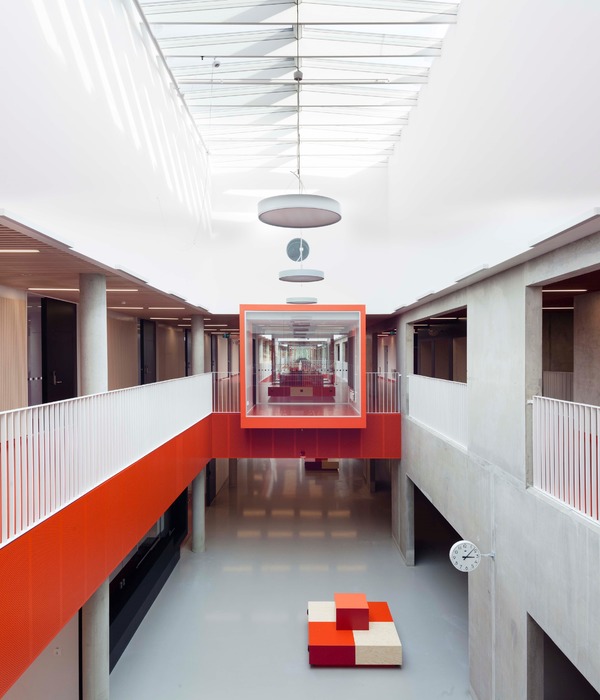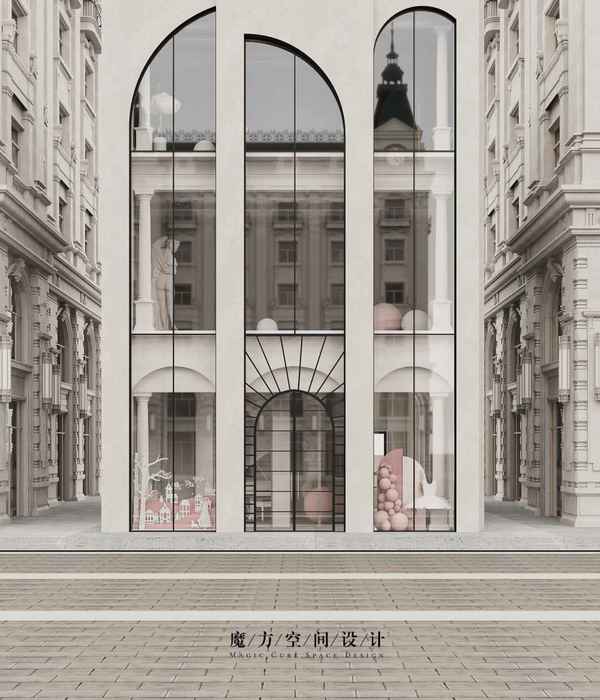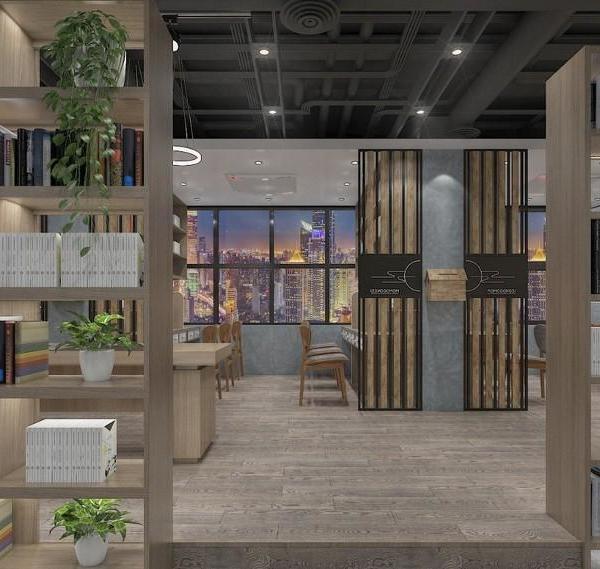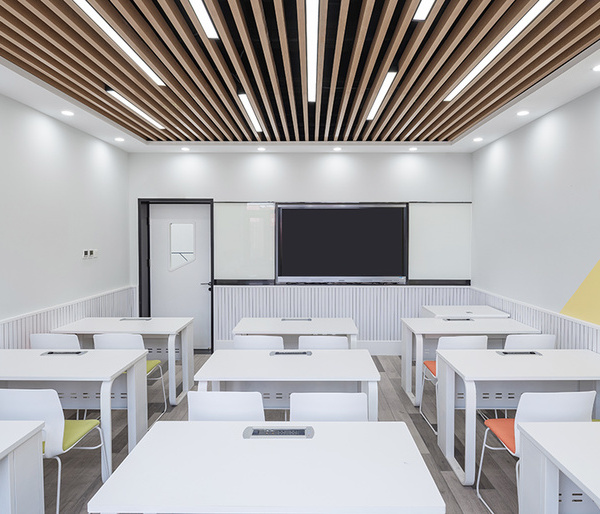To the north of King’s Cross and St Pancras International railway stations, 67-acres of derelict land is being transformed in what is one of Europe’s largest urban regeneration projects. The result will be a vibrant mixed-use quarter, at the physical and creative heart of which will be the new University of the Arts London campus, home of Central Saint Martins College of Arts and Design.
Stanton Williams’ design for the £200m new campus unites the college’s activities under one roof for the first time. It provides Central Saint Martins with a substantial new building, connected at its southern end to the Granary Building, a rugged survivor of the area ’s industrial past. The result is a state-of-the-art facility that not only functions as a practical solution to the college’s needs but also aims to stimulate creativity, dialogue and student collaboration. A stage for transformation, a framework of flexible spaces that can be orchestrated and transformed over time by staff and students where new interactions and interventions, chance and experimentation can create that slip-steam between disciplines, enhancing the student experience. The coming together of all the schools of Central Saint Martins will open up that potential.
The design aims to maximise the connections between departments within the building, with student and material movement being considered 3-dimensionally, as a flow diagram North to South, East to West, and up and down – similar in many ways to how the grain was distributed around the site using wagons and turntables.
King’s Cross offered a unique opportunity: a large site within what promises to be a creative and cultural hub, connected (via King’s Cross Station and the restored St Pancras International) not only to the rest of Britain but also to mainland Europe, plus the chance to develop a robust contemporary architectural response to the boldness of the existing buildings on the site.
The Granary Building itself has been restored as the main ‘front’ of the college, facing a new public square that steps down to the Regent’s Canal. The building was designed in 1851 to receive grain from the wheat fields of Lincolnshire, unloaded here from railway wagons onto canal boats for onward transport to the capital’s bakeries. It comprises a solid, six-story cubic mass, with an unadorned, 50-metre wide brick elevation, extended to 100-metres by office additions flanking the building. To the north, located one to each side of the Granary Building, are two parallel 180 metres long Transit Sheds. The design strategy retains the Granary Building, adapted to include functions such as the college’s library, while the Eastern Transit Shed behind is converted to create spectacular workshops for the college. Within the street-level openings of the Western Transit Shed, new shops and bars will add further life to the area. The historic horse stables below the Eastern Transit Sheds have been transformed to new cycle stores for students and staff.
The bulk of the college’s accommodation, however, is located in a major addition to the site, two substantial new studio buildings that occupy the space between the two transit sheds and which, at the North end of the site present a contemporary elevation to the surrounding area. The scale of the new addition responds closely to that of the Granary Building, essentially continuing its massing along the length of the site. It rises above the level of the transit sheds, using contemporary materials so that it will stand, beacon-like, as a symbol of the college’s presence within this rapidly-evolving part of London. The two new four-storey studio buildings are arranged at either side of a covered central ‘street’, some 110m long, 12m wide and 20m high, covered by a translucent ETFE roof and punctuated by a regular rhythm of service cores that accommodate lifts, stairs and toilets. At the northern end, a new centre for the Performing Arts will house a fully equipped theatre complete with fly-tower as well as rehearsal and teaching spaces.
The internal ‘street’ has been conceived as a dynamic area, an arena for student life, akin to the much-loved stair at the centre of the college’s previous main building. Bridges linking the various cores and workspaces cross it, offering break-out areas for meeting, relaxing and people-watching and exchanging ideas. The street will be used for exhibitions, fashion shows and performances, the spaces being large enough to build temporary pavilions for example. Viewing points allow students to watch others working or performing, and the work of other disciplines can be seen and exhibited.
At the southern end of the new block and running parallel with the north end of the Granary Building is a second covered ‘street’, offering public access through this part of the building interior. Lifts rising through this space recall the vertical movement of grain, which gave the complex its original purpose. Flooring details either retain existing turntables or hint at their historic location, while within the Granary Building itself, the hoists have been retained, crowning a newly inserted lightwell. Simple glazing maintains the integrity of the unbroken openings, rhythmically punctuating the Granary Building’s main façade.
The new University of the Arts London campus is one of the first parts of the King’s Cross development to be completed. As such, it not only provides Central Saint Martins with the flexible and dynamic spaces that it needs to educate and develop the artists and designers of the future, but also makes a firm statement of the role of the Arts in the quarter, to which it will give critical mass and energy.
Facts and Figures
The £200m campus brings together 4,000 Central Saint Martins students and 1,000 staff under one roof. It is made up of: • 10 acres of floor space • Over 1.3 million timber blocks • Enough concrete to fill eight Olympic swimming pools
The three-storey building is based around an internal street, naturally lit through a translucent roof.
It contains four levels of multi-purpose workshops and specialist studios, including: • Performance design and practice labs • Casting, wood fabrication and metal fabrication workshops • Post-production workshops • Film, effects and sound studios • Architecture and spatial studios • Fashion and textiles studios • Photography studios and darkrooms • Product and industrial design studios • Graphic and communication design studios • Jewellery workshops • Art studios
The campus is also home to a 350 seat public theatre with its own entrance.
It occupies the Grade II listed Granary Building, built in 1851, which managed the storage and distribution of grain at the height of the Victorian industrial boom.
It faces onto Granary Square which, when completed in June 2012, will be one of London’s largest public squares. The campus has been designed by architects Stanton Williams and forms part of King’s Cross, a 67 acre development in central London – a new piece of the city with a brand new postcode, London N1C. King’s Cross is being developed by the King’s Cross Central Limited Partnership, which brings together Argent Group, London & Continental Railways and DHL Supply Chain.
在国王十字路口和St Pancras国际火车站的北面,一处废弃的67亩地上演了欧洲最大的市区重建项目 – 伦敦艺术大学中央圣马丁艺术与设计学院的新校园。
这里遍布的新建筑与老建筑完美结合,不光坚固耐用,还提供最先进的设施,解决学校功能并激发学生的对话,创造力,合作。这里空间框架可以灵活的适应学生,工作人员的各种实验和功能需求。设计将建筑之间的流线和联系提高到极限。
附近的国王十字路和国际车站为这个校园成为一个文化和创意枢纽提供了基础,这不仅仅与英国相连,也与整个欧洲联系紧密。
在原有粮仓建筑上形成的学校前面有公共广场,离摄政河咫尺之遥。1851设计的这个6层方形老建筑本是铁路运输和运河运输的仓库,现在被增建了长达100米的工作区域,设置了两个平行的大厅,老建筑被保持并用做图书馆。西侧临街生活区面向商店和酒吧开放了出入口。
在建筑的内部,建筑物之间的区域覆盖上半透明的ETFE屋顶,这些区域长110米,12米宽,20米高,就像是街道。电梯,楼梯还有厕所布置在附近。北端将有一个设备齐全的剧场,包含排练和教学空间。这里的“街道”充满活力,是学生生活的舞台,各个工作区之间用跨桥联系,提供休息,会议,休闲和交流场所。“街道”还能用做展览,时装秀,表演。原有建筑的一些复杂功能设施如升降机都被保留。地板等细节处理也彰显这这个建筑历史。
现在完成的部分只是以其的一部分,所以这里不光提供灵活多变的空间,也鲜明的展现着姿态:这里培养着未来的艺术家和设计师。
Key Values Project Value: £200M (based on cost of land, building, fit-out and expansion incl. third floor)
Key dates Construction Start date: January 2008 Completion Date: April 2011 Date of Occupation: August 2011 Construction phase: January 2008 – August 2011 (Incl. fit-out) Student arrival: 3rd October 2011
Building Details Postal Address: Granary Building, 1 Granary Square, London, N1C 4AA Gross Internal Area: approx. 40,000m2
Design team Site Developer: Argent Tenant: University of the Arts London Architect: Stanton Williams Structure: Scott Wilson Environmental / M&E engineering: Atelier 10 Architectural lighting: Spiers and Major Quantity Surveyor / Employer’s Agent: Davis Langdon Landscape Architect: Townsend Landscape Architects. Facade consultant: Arup Facades Engineering CDM coordinator: Scott Wilson.
Contractor team – base build Main contractor: Bam Construction Limited Contractor’s Architect: Bam Design (new buildings) / Weedon Partnership (Granary) Conservation Architect: Richard Griffiths Architects Structure: Bam Design (new buildings) AKS Lister Beare (existing structure) M&E engineering: Bam Design Fire consultant: Aecom Acoustic consultant: Sandy Brown Associates Access consultant: All Clear Design
Contractor team – fit-out Contractor: Overbury Interior fit-out Architect: Pringle Brandon M&E consultant: AECOM Fire consultant: AECOM Theatre consultant: Drama by Design Acoustic consultant: Sandy Brown Associates
{{item.text_origin}}












